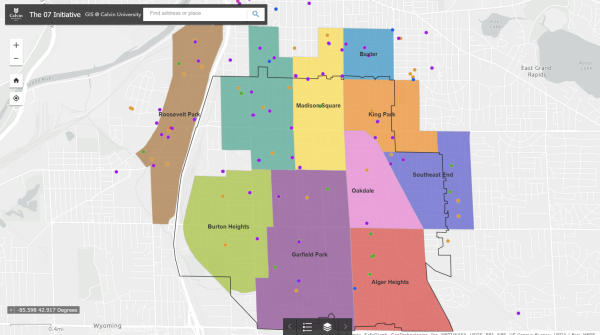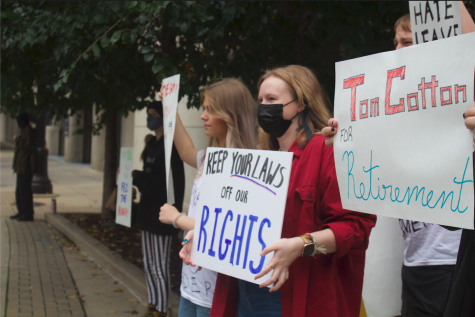Division Avenue Arts Collective announces fundraiser for new venue
Last year, the Division Avenue Arts Collective (DAAC), a local all-ages music venue, art gallery and do-it-yourself (DIY) project incubator, left its location of 10 years in the Heartside neighborhood on 115 S. Division Ave. when the building was abruptly sold.
But fans of local art, music and culture should not forget about the DAAC just yet. Members of the DAAC board recently announced the launch of a new fundraising campaign that would, if successful, help find the DAAC a permanent new location in Grand Rapids.
Members of the DAAC board remain passionate about the DAAC’s contribution to the culture of Grand Rapids.
“Over the past 10 years we have hosted thousands of events ranging from art exhibitions, music shows, puppet shows, creative workshops, the really free market, lectures, film screenings and have awarded over $3,300 to local creative projects in the form of Sunday soup micro-grants,” said DAAC board member Mike Wolf.
“The DAAC has supported the local arts and culture of GR on every level. Whether it’s for a band just getting started or one signed to a major label, a kid who doodles on his homework or an artist with an MFA, a student organization or a congressional election watch party, we treat every event the same because we believe that arts and culture should be accessible and people should actively participate in their community.”
Of particular importance to the DAAC board is the all-ages aspect of the venue:
“Youth under 21 are routinely shut out of live music all across the country. It’s a shame because more often than not arts and music are the things that have the power to get youth under 21 excited and motivated to create something of their own. There have been so many bands that have had their first show at the DAAC when they were teenagers,” said Wolf.
Wolf recalled the story of Sam Cook-Parrot, a young artist from Grand Rapids who plays in the band Radiator Hospital.
“When he was a teenager he started going to shows, then formed bands with his friends. Those bands played what seems like every other DAAC show, and on top of that he also interned at Vertigo and WYCE. He has since moved to Philly and continues to release music on a regular basis online, plays tons of shows, is starting to tour, play in bands with his friends who are also touring, playing all across the country and it all started at the DAAC.”
Wolf hopes that reopening the DAAC will give other young artists the opportunity to express themselves in a way that would otherwise not be possible.
The DAAC board, which consists of nine members, started the fundraising campaign with the assistance of both national and local organizations. Fractured Atlas, a New York-based national non-profit which supports arts organizations and artists through the provision of financial, business and educational resources, stepped in to aid the DAAC in their comeback attempt.
“Through Fractured Atlas, the DAAC is able to access opportunities that are normally only available to traditional 501(C)3 nonprofits, such as the ability to receive tax-exempt donations,” said DAAC board member George Wietor. “It will aid in our immediate fundraising efforts and help us make the leap if and when we decide to become a nonprofit of our own.”
Alongside the DAAC stand a number of local, grassroots arts-based organizations that are providing fiscal sponsorship to campaign, such as the Lamp Light Music Festival, Do-It-Together Grand Rapids and Many Hands Clay Collective.
Furthermore, house shows throughout Grand Rapids have continued hosting shows to raise funds for the project, including a Radiator Hospital show in January at the Neighborhood House on Sigsbee Avenue, currently occupied by DAAC board member, CARE band member and Calvin alumnus Justin Majetich.
The DAAC online fundraising campaign can be found at RocketHub.com, a popular crowd funding site. DAAC board members seek to earn $20,000 by Feb. 25 and have reached $5,036, or 26 percent of their goal, as of this week.
DAAC board has not yet found an exact location for the DAAC’s permanent return, but Wolf says that they would like the space to hold 150-200 people with additional space for a ceramics studio and other programming. “Moving forward, we’re looking for a space that can not only support our immediate needs — we also want there to be enough room for us to grow in the future.”
DAAC board members remain optimistic that Grand Rapids residents will support their efforts to find a home for the DAAC once more.
When asked about how Grand Rapids residents should feel towards the DAAC’s impact in Grand Rapids, DAAC board member Marlee Grace expressed excitement: “It’s so hard to put into words. In some ways you have to feel it to know why. You have to have been inside for those shows or experiences that left you feeling so full inside that you didn’t know where to put it.
Having an all ages music space is radical. It’s a big deal. And living in a town that has one brings so much value and vitality to the community that can’t be put into words. You gotta feel it. So if we bring it back, we can all feel it.”








